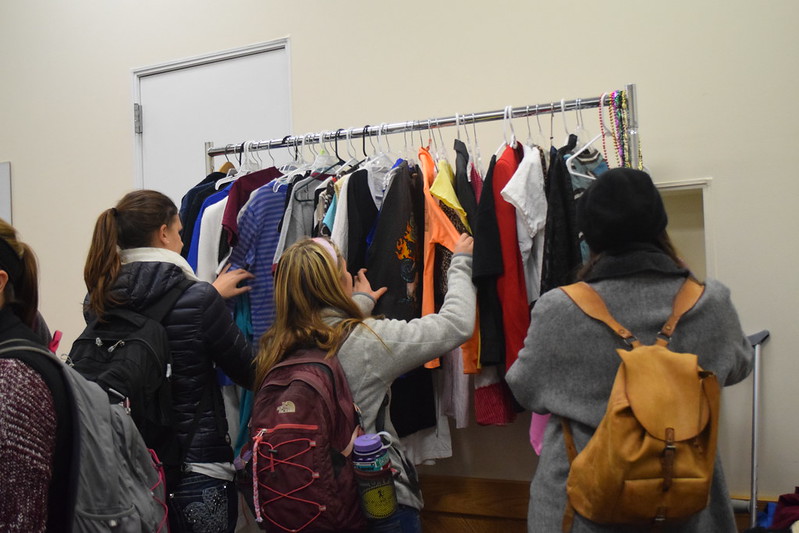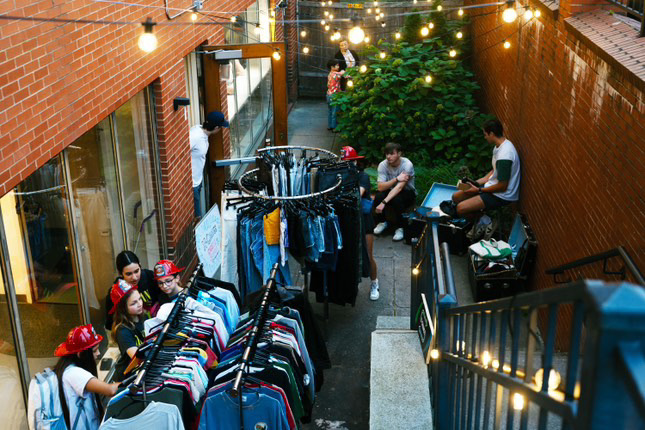If you’re up-to-date with fashion trends, or even active on social media, you probably have encountered colorful advertisements displaying bright, fast-fashion brands from a number of different generic websites.
Shein, one of these websites, dominates teen and young adult culture, with its popularity soaring since 2020. Although the site itself has been around since 2008, Shein gained headway in the past few years due to the sudden surge of pandemic shopping, low prices and most importantly, the ability to instantly adopt and sell the hottest trends in youth culture around the globe.
However, Shein hasn’t been able to escape controversial claims of child labor, stolen ideas and selling offensive items. Shein has a persistent association with disregarding their environmental impact and employee well-being.
Because of this, many people try to refrain from purchasing anything from Shein. Some opt for thrifting and shopping at small businesses instead. But Shein’s rock-bottom prices continue to draw in millions of new shoppers every year.
In 2022, Shein garnered higher brand equity scores from customers compared to past years. In the second quarter of the year, Shein had an average increase in 3.1 points for customer’s thoughts on brand quality, and 4.1 points in customer’s consideration of purchasing.
In the search for more guilt-free alternatives, young adults and students have experimented with Shein’s runner-ups. These companies and online retailers seemed to have popped-up out of nowhere, yet feature the same colorful ads and marketing as their leading competitor. Here’s a list of Shein alternatives, along with how they compare in terms of price, quality, values and sustainability.
Cider
Cider debuted in 2020, right after Shein’s viral market takeover. With its headquarters also located in China, Cider shows many similarities to Shein in terms of branding and style, with an emphasis on being “eco-friendly.”
They rely on the “sustainability” portion of their website, along with a whole clothing section dedicated to the hashtag, “#RecycledCider.” Yet unlike Shein, they haven’t yet released an official sustainability report.
Cider’s website does include community missions and goals for the future, with active updates on what they’re improving. Nowadays, it’s becoming hard to tell what’s trustworthy on sites like this, as they could just be deflecting from the issue or applying greenwashing marketing tactics.
However, Cider’s website is more convincing than others in terms of being transparent with their efforts. This includes using biodegradable packaging, clothes that use 100% recycled fabric and an effort to only produce clothes they know will be bought: resulting in fewer options than Shein, yet less waste.
Contradictions, however, lie in third-party websites that measure the companies’ sustainability. These websites claim that Cider doesn’t make an effort to reduce greenhouse gas emissions, water use or hazardous chemicals. One thing Cider is praised for is their commitment to not using any animal products aside from wool.
In terms of quality, Cider is one of the brands that I frequent the most when it comes to online shopping. There are a lot of unique pieces that last longer than most Shein options. Whenever I order from Cider, I know that it’s unlikely I’ll be disappointed by the quality.
ThredUp
ThredUp is at the forefront of online thrift shopping. Similar to a normal thrift store, you can choose from a mix of both discounted name-brand clothing as well as unknown or off-brand pieces.
This store is one of the best options in terms of sustainability, as no new clothing is actually being produced. On their website, they provide a 2021 impact report, 2022 resale report and an Environmental, Social and Governance report.
These resources illustrate how online resale truly impacts environmental change, and it’s also highly preferred by consumers both economically and emotionally. In ThredUp’s ESG brochure, you can easily find stats that show how much the company has spent on volunteering and charity organizations as well ($94,000 in total), which is uncommon for online-exclusive stores.
For an online-only retailer, the prices aren’t as low as I’d hoped. I picked one button-up sweater from Zara on ThredUp and reverse-image searched on Google, and found that the same thing was going for way cheaper on other user-based thrifting apps such as Poshmark and Carousell. For college students, ThredUp may not be the most cost effective option.
Depop
Depop is one of the most well-known thrifting marketplace apps, and it’s notorious for its young clientele. The app is easier to navigate than ThredUp and less overwhelming than Shein, with low prices.
The only thing that isn’t guaranteed is product quality, as this app is run by individual sellers instead of a centralized warehouse. To combat this, Depop does oversee negative reviews and acts on dishonest and inactive users, which adds some trustworthiness.
Depop also makes its values, goals and ESG reports transparent and available. Depop recently announced that they instituted a two year sustainability plan with active progress already being made.
Included within this plan, Depop required their employees to undergo training in diversity, equity and inclusion, general data protection regulation, harassment, discrimination, insider trading and greenwashing.
This illustrates that Depop is going above and beyond to train their employees, even though they don’t work in physical retail stores. They also stress that employee wellbeing is one of their top priorities, which is impressive for a store that doesn’t even involve factory work.
I’ve only had good experiences on Depop. Compared to similar apps such as Mercari and Poshmark, Depop is more clothing and trend focused. Mercari is more for items and Poshmark is more catered toward older populations. The prices are dependent on the seller, but most of the time you can find unique pieces for cheap. Though it’s helpful to cross-reference to make sure you’re not getting ripped off.
Emmiol
Emmiol also debuted in China around the same time as Cider. They focused first on women’s fashion before eventually switching to unisex. Emmiol’s style is different than the other brands listed, focusing more on grunge and oversized clothing.
This strategy pushes them towards one niche, making it harder for them to overextend the limits of how many different styles they can produce, like Shein. Emmiol may be putting in effort to be sustainable, however, Emmiol offers little transparency in terms of proof that they’re practicing what they preach.
If we choose to trust the claims on their website, Emmiol seems extremely progressive when compared to other fast-fashion brands. But, actions speak louder than words. Emmiol claims to strictly forbid using leather or fur in their products. They also claim to donate to the Animal Protection Association, and have an active counter to track how many trees they plant each year, as well as their water-use and the CO2 emissions they produce.
If true, this is a big step for fast fashion brands and makes me want to believe that Emmiol is one of the best alternatives to Shein, although they don’t use biodegradable packaging. There are potential plans to adopt sustainable packaging, as they frequently partner with the organization Onetreeplanted to offset their carbon footprint.
After doing research and seeing the reviews, it’s safe to say that Emmiol is one of the best Shein alternatives when taking price, quality and sustainability into account.
Although it’s easy to buy clothes from retail stores we’re familiar with, it’s becoming more important than ever to think before we buy. Ultimately as college students, thrifting can help both our wallets and our conscience, allowing us to make our shopping habits a little more sustainable.
Amalia Wompa can be reached at [email protected].


















